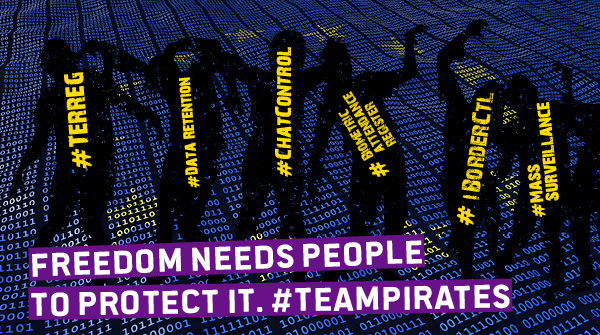Controversial EU anti-terror internet regulation TERREG: Civil society protest ahead of plenary vote
At the end of April, the European Parliament will vote on the regulation to prevent the dissemination of terrorist content online (TERREG). In a letter published today, the non-governmental organisations Liberties, EDRi, Access now and Wikimedia urge MEPs to vote against the regulation. The letter is supported by 61 other NGOs, including Amnesty International and Human Rights Watch.
Pirate Party MEP Patrick Breyer and the Green/EFA group welcome the initiative and will oppose the regulation. As negotiator for his group (shadow rapporteur), Breyer states:
“We have achieved important partial successes: Preventing an obligation on platforms to use error-prone upload filters, explicitly protecting journalism, art and science as well as introducing an exception for small and non-commercial operators from the 1-hour deletion deadline. Still the unprecedented ultra-fast cross-border removal orders without judicial review threaten freedom of expression and freedom of the press online.
The fact that Victor Orbán will be able to have digital content deleted throughout the EU opens the door to politically motivated internet censorship – especially since the definition of terrorism is alarmingly broad and susceptible to abuse. Anti-terror laws have repeatedly been used for completely different purposes, for example against the Catalan independence movement, against social protests in France, against climate activists and immigrants. Cross-border removal orders harmonise freedom of expression in Europe to the lowest common denominator. They also set a precedent and are to be generally introduced with the Digital Services Act. In line with the court ruling on the unconstitutional French AVIA law, this far-reaching EU anti-terror internet regulation likely disproportionately restricts the fundamental right to freedom of expression and will be annulled by the courts. Nothing is more ineffective against terrorism than repealed legislation.
Overall, this regulation is unlikely to prevent terrorist attacks. To prevent terrorist radicalisation and recruitment, it would make more sense to address legitimate grievances such as discrimination against Muslims and human rights violations, and to provide stable funding for civil society work against hate ideology and Islamism, as well as de-radicalisation and exit programmes. Finally, vigorously prosecuting terrorism and messages inciting terrorist actions is of essence. Too often, terrorists have been known to the police for a long time, but their tracks have not been followed up. Yet the new terrorist content online regulation fails to oblige platforms to report criminal terrorist speech to the police, because governments consider systematic prosecution is too much work. This is scandalous.”


Comments